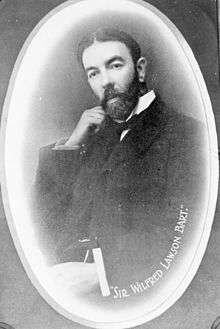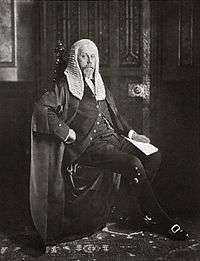Penrith (UK Parliament constituency)
Penrith was a parliamentary constituency centred on the town of Penrith in Cumberland, England. It returned one Member of Parliament (MP) to the House of Commons of the Parliament of the United Kingdom, elected by the first past the post system.
| Penrith | |
|---|---|
| Former County constituency for the House of Commons | |
| 1885–1918 | |
| Number of members | one |
| Replaced by | North Cumberland and Penrith and Cockermouth |
| Created from | East Cumberland |
History
The constituency was created by the Redistribution of Seats Act 1885 for the 1885 general election, and abolished for the 1918 general election.
Members of Parliament
| Year | Member | Party | |
|---|---|---|---|
| 1885 | Henry Howard | Liberal | |
| 1886 | Liberal Unionist | ||
| 1886 | James Lowther | Conservative | |
| 1905 | Speaker | ||
| 1918 | constituency abolished | ||
Elections
Elections in the 1880s
| Party | Candidate | Votes | % | ± | |
|---|---|---|---|---|---|
| Liberal | Henry Howard | 3,921 | 53.2 | N/A | |
| Conservative | James Lowther | 3,448 | 46.8 | N/A | |
| Majority | 473 | 6.4 | N/A | ||
| Turnout | 7,369 | 80.8 | N/A | ||
| Registered electors | 9,123 | ||||
| Liberal win (new seat) | |||||

Lawson
| Party | Candidate | Votes | % | ± | |
|---|---|---|---|---|---|
| Conservative | James Lowther | 3,676 | 54.8 | +8.0 | |
| Liberal | Wilfrid Lawson | 3,032 | 45.2 | −8.0 | |
| Majority | 644 | 9.6 | N/A | ||
| Turnout | 6,708 | 73.5 | −7.3 | ||
| Registered electors | 9,123 | ||||
| Conservative gain from Liberal | Swing | +8.0 | |||
Elections in the 1890s
| Party | Candidate | Votes | % | ± | |
|---|---|---|---|---|---|
| Conservative | James Lowther | 3,549 | 50.9 | −3.9 | |
| Liberal | Thomas Sadler Douglas | 3,424 | 49.1 | +3.9 | |
| Majority | 125 | 1.8 | −7.8 | ||
| Turnout | 6,973 | 79.8 | +6.3 | ||
| Registered electors | 8,733 | ||||
| Conservative hold | Swing | −3.9 | |||
| Party | Candidate | Votes | % | ± | |
|---|---|---|---|---|---|
| Conservative | James Lowther | 3,868 | 54.2 | +3.3 | |
| Liberal | Thomas Sadler Douglas | 3,268 | 45.8 | −3.3 | |
| Majority | 600 | 8.4 | +6.6 | ||
| Turnout | 7,136 | 80.1 | +0.3 | ||
| Registered electors | 8,914 | ||||
| Conservative hold | Swing | +3.3 | |||
Elections in the 1900s
| Party | Candidate | Votes | % | ± | |
|---|---|---|---|---|---|
| Conservative | James Lowther | Unopposed | |||
| Conservative hold | |||||

Lowther
| Party | Candidate | Votes | % | ± | |
|---|---|---|---|---|---|
| Speaker | James Lowther | Unopposed | |||
| Speaker hold | |||||
Elections in the 1910s
| Party | Candidate | Votes | % | ± | |
|---|---|---|---|---|---|
| Speaker | James Lowther | Unopposed | |||
| Speaker hold | |||||
| Party | Candidate | Votes | % | ± | |
|---|---|---|---|---|---|
| Speaker | James Lowther | Unopposed | |||
| Speaker hold | |||||
gollark: Chrome is, in fact, a proprietary spying-packed Google product.
gollark: People SHOULD NOT be forced to use proprietary Google services for your site.
gollark: > cross browser compatibility is overrated. all computers have both chrome and firefox. even if they dont, they take 5 minutes to install.No. You are wrong.
gollark: Java. Really?
gollark: That would be EEWCO.
References
- The Liberal Year Book, 1907
- Craig, FWS, ed. (1974). British Parliamentary Election Results: 1885-1918. London: Macmillan Press. ISBN 9781349022984.
- Debrett's House of Commons & Judicial Bench, 1901
- Debrett's House of Commons & Judicial Bench, 1916
| Parliament of the United Kingdom | ||
|---|---|---|
| Preceded by Carlisle |
Constituency represented by the Speaker 1905–1918 |
Succeeded by Penrith and Cockermouth |
This article is issued from Wikipedia. The text is licensed under Creative Commons - Attribution - Sharealike. Additional terms may apply for the media files.